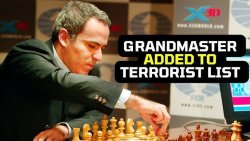
The Honorable Dissent: Garry Kasparov's Stand Against Autocracy
08.03.2024 13:15 | NewsChess legend Garry Kasparov, once a master of strategic play on the chessboard, now plays a more dangerous game against political tyranny.
What Does the Word "Terrorist" Mean? The usage of the word terrorism has two fundamental dimensions – academic-analytic and political or public. Both play their role but also have significantly different impacts and characteristics.
In the academic environment, there is naturally no consensus on a precise definition of terrorism. This is similar to most social science terms. However, generally accepted definitions share several unifying points. Terrorism must involve committing violence primarily against civilians to instigate fear with the aim of changing their behavior. This leads to achieving a certain political goal.
Terrorism is perceived as a method of advancing political interests or an asymmetric tactic of warfare. It is not necessarily associated with any ideology. This tactic has been and is used by organizations with various ideological backgrounds around the globe.
On the contrary, from a political perspective, the category of terrorist groups significantly broadens. Here, it's not necessarily about classifying actors based on their characteristics and behavior, but about declaring their "inhumanity." Essentially, it's about declaring the incompatibility of such an entity's existence with a given state or certain system. State lists of terrorist organizations don't necessarily correspond with generally accepted definitions of terrorism. These lists feature very different types of organizations. Instead, they declare absolute hostility, marking the organization beyond the scope of regular rules and often securing the possibility to use otherwise illegal methods against such a group. It's a political act. Negotiations with terrorists are not conducted.
Terrorist Garry Kasparov In a move that starkly illustrates the clash between dissent and authoritarian power, the Russian financial watchdog labeled Garry Kasparov, a former chess grandmaster and staunch critic of the Kremlin, as a "terrorist and extremist." This designation, as reported by Politico, severely restricts Kasparov's financial freedoms in Russia, a country he left in 2013 to escape political persecution. Kasparov's response to this designation was defiant and dismissive, calling it an "honor" that rather highlights the repressive nature of Putin's regime than weakens his own position or conviction.
Since ending his professional chess career in 2005, Kasparov has been a vocal critic of Vladimir Putin's government. His political activism, especially in reaction to Russia's aggressive actions in Ukraine, led to him being labeled a "foreign agent" by the Russian government in 2022. Kasparov's life and career, from a chess prodigy to a political dissident, embody the struggle for freedom and democracy against an increasingly authoritarian Russia.
Is Garry Kasparov Really a Terrorist? Garry Kasparov, known as a chess grandmaster and political activist, was recently designated as a terrorist and extremist by the Russian financial watchdog Rosfinmonitoring. This designation has sparked international attention and debates about its legitimacy. Kasparov is known for his criticism of Vladimir Putin and his regime, which led to his listing on this register. However, it's essential to realize that his "terrorist" labeling results from his political activism and opposition to Putin's government, not evidence of any actual terrorist activity.
Kasparov was born in Baku, Azerbaijan, and excelled in chess from a young age, becoming the youngest world champion in history at 22. After ending his chess career, he engaged in political activism and writing, criticized Putin's regime, and founded several movements against his government. Kasparov also expressed support for sanctions aimed at individuals and their wealth, demonstrating that authoritarian leaders like Putin cannot guarantee complete protection in exchange for loyalty.
His inclusion on the list of terrorists and extremists was criticized as a politically motivated move to silence and discredit his opposition activities. Considering his history and contributions, labeling Garry Kasparov as a terrorist is more a reflection of his status as a prominent critic of the Russian regime than a legitimate accusation of terrorism. Kasparov's activities and legacy remain strongly linked to his efforts to support democracy and human rights, as shown by his work with the Human Rights Foundation and other organizations.
The World is Not Black and White The idea that the world is not black and white relates to the diversity of perspectives and situations that cannot be simply categorized as good or bad. In the context of the article about Garry Kasparov and his designation as a terrorist by the Russian state, this notion gains a specific context. Kasparov, regarded as one of the greatest chess grandmasters of all time, turned to political activism against Vladimir Putin and his regime after ending his chess career. His listing as a "terrorist and extremist" reveals the complexity of the situation and shows how labels and accusations can be used for political purposes.
In the context of the idea that the world is not black and white, it's important to understand that Kasparov's opposition to Putin and his regime can be interpreted from one side as a fight for democracy and human rights, while from another side, the regime may view it as a threat and an attempt at destabilization. This presents a complex reality of political and personal conflicts, where the actions and motivations
Brief Summary in Points of Kasparov's Life:
- Chess Prodigy:Dominated the chess world for over two decades, becoming World Chess Champion in 1985.
- Political Activism:Transitioned to political activism after retiring from chess in 2005, openly criticizing Putin's regime.
- Exile:Left Russia in 2013 to avoid persecution, continuing his activism from abroad.
- Author and Speaker:Published "Winter is Coming" in 2015, warning of the dangers posed by Putin's Russia.
- Opposition Leader:Co-founded the Anti-War Committee in response to Russia's invasion of Ukraine, advocating for global recognition of Russian leaders as war criminals.
